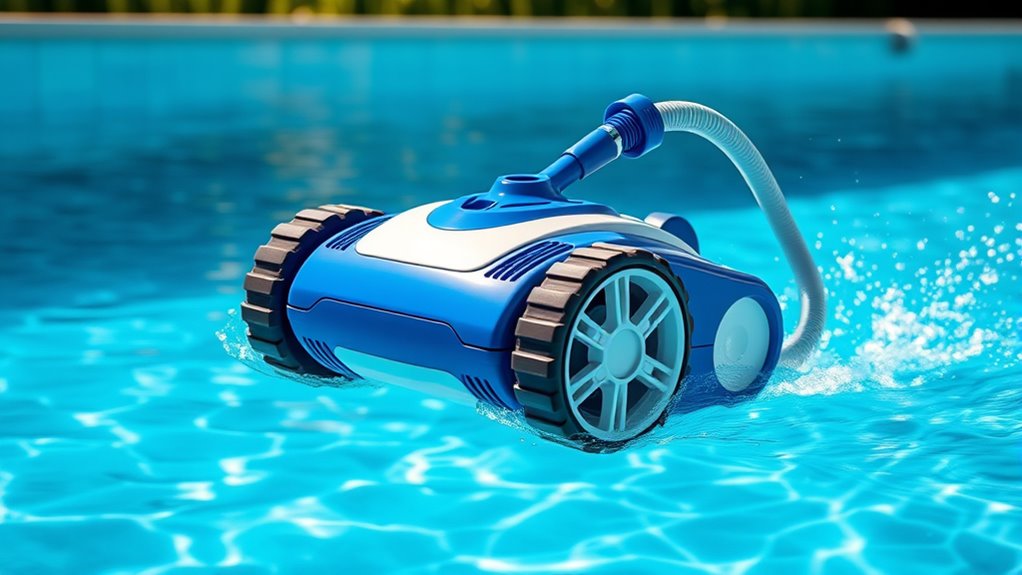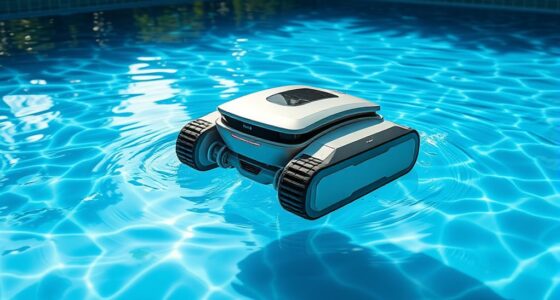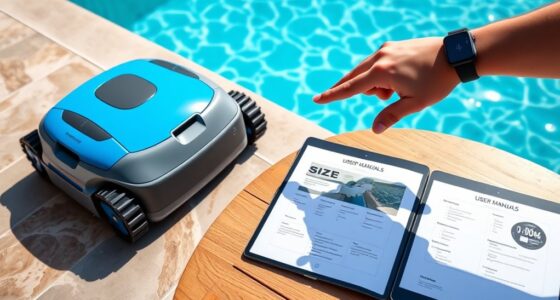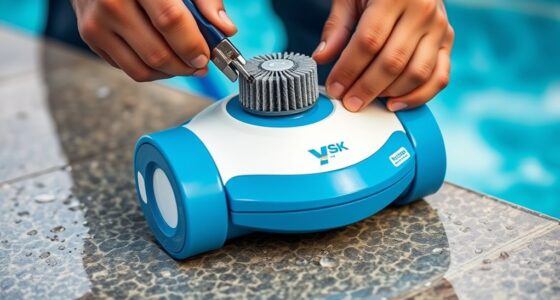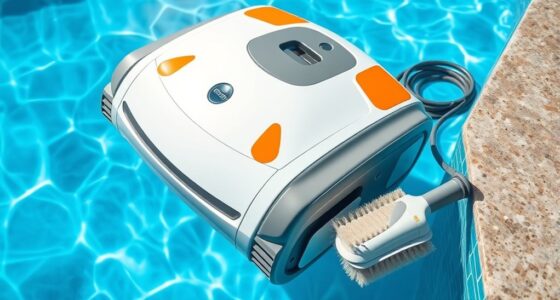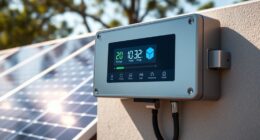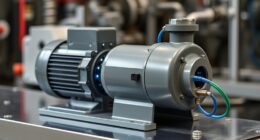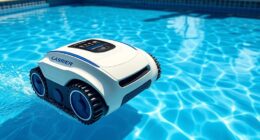When choosing a pressure pool cleaner, focus on strong suction power and efficient debris removal to keep your pool spotless. Look for models with good maneuverability and wide coverage to minimize missed spots, and guarantee setup is simple with user-friendly controls. Hose flexibility and durability are key for long-lasting performance, while energy efficiency can save you money over time. For a thorough understanding of these features and more, keep exploring to find the best fit for your pool.
Key Takeaways
- Strong suction power and effective debris removal for thorough cleaning.
- Easy setup, user-friendly controls, and programmable features for convenience.
- Flexible, appropriately sized hoses that prevent tangling and improve maneuverability.
- Durable build with corrosion-resistant materials for long-lasting performance.
- Energy-efficient operation with low maintenance needs for cost savings.
Suction Power and Cleaning Efficiency
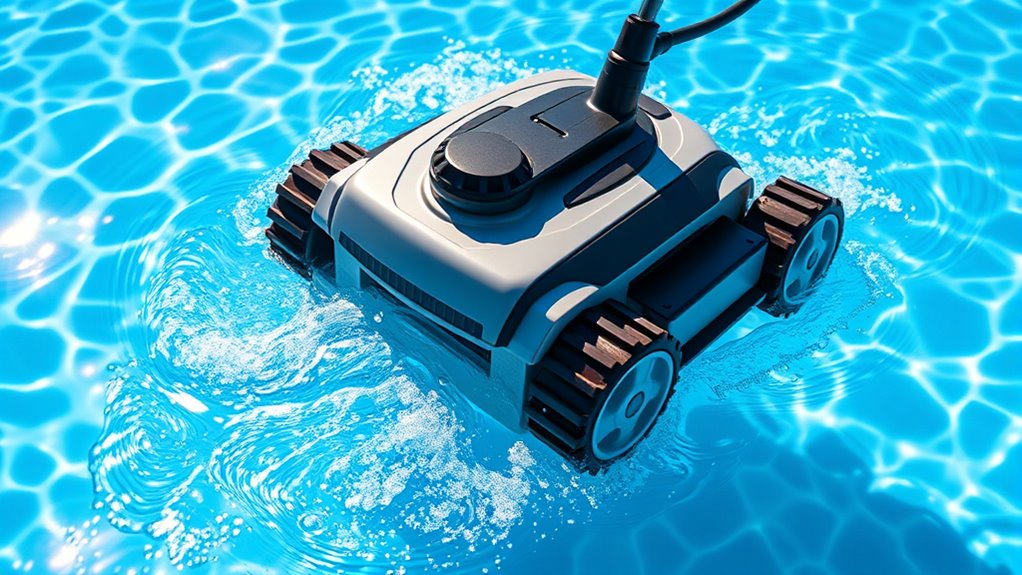
A pressure pool cleaner’s suction power directly impacts how effectively it removes debris from your pool. If the suction isn’t strong enough, debris like leaves, dirt, and small particles may clog the filter more often, reducing cleaning efficiency. Higher suction power improves debris capacity, allowing the cleaner to pick up larger amounts of debris before needing to pause for filter cleaning. This means fewer interruptions and a cleaner pool in less time. Additionally, creating a conducive environment can support focused and effective cleaning performance. Proper pool chemistry and minimal obstructions can enhance the cleaner’s performance and prolong its lifespan. However, if the suction is too weak, debris can accumulate quickly, leading to frequent filter clogging and compromised performance. Look for a model with adjustable suction or strong, consistent suction to maximize debris capacity and reduce filter clogging. This balance ensures thorough cleaning with minimal maintenance.
Maneuverability and Coverage Area

Strong suction power helps your pressure pool cleaner gather debris efficiently, but to guarantee it covers the entire pool thoroughly, maneuverability and coverage area are just as important. Look for a cleaner with good navigation ease, so it can easily move around obstacles and navigate tight corners. A model with a wide coverage zone ensures it can clean larger sections without missing spots. Some cleaners use advanced steering or random pattern movement to maximize coverage. This reduces the chances of leaving debris behind and minimizes the need for manual intervention. The ability to maneuver smoothly across different pool shapes and surfaces means fewer missed areas and a more efficient cleaning process. Additionally, self-watering plant pots feature a reservoir system that maintains consistent moisture, which is essential for healthy plant growth and can be compared to how a well-designed pool cleaner maintains consistent cleaning coverage. Properly designed navigation systems can further enhance overall cleaning performance by adapting to various pool configurations, ensuring comprehensive coverage. Incorporating advanced steering technologies can further improve the cleaner’s ability to adapt to complex pool layouts, leading to more thorough cleaning. The integration of sensor-based detection can help identify dirty spots and focus cleaning efforts where they are needed most, increasing efficiency. A mapping capability allows some cleaners to create a virtual layout of the pool, improving coverage accuracy. Prioritizing maneuverability and coverage area helps you enjoy a cleaner pool with less effort.
Ease of Setup and Operation
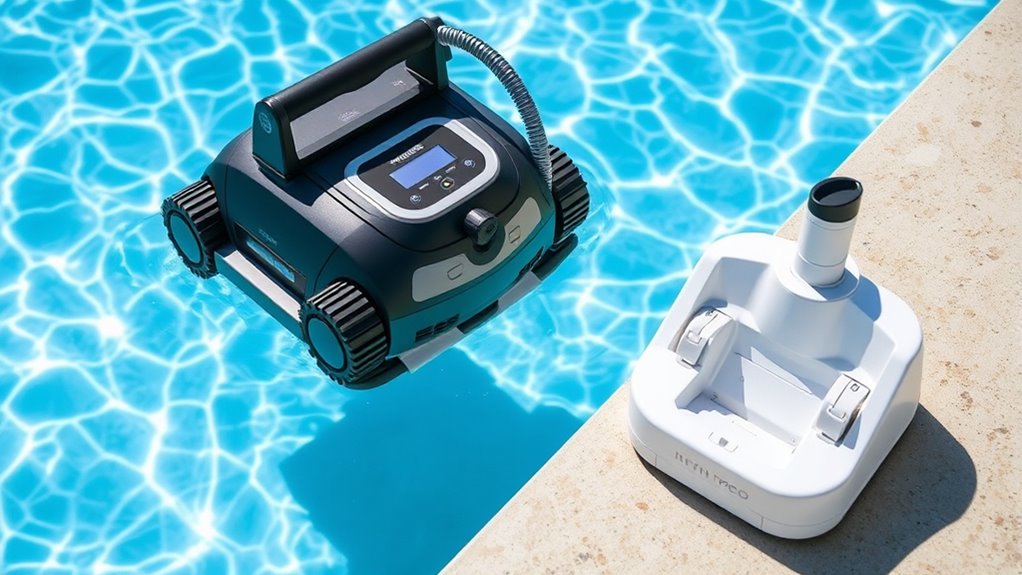
Setting up your pressure pool cleaner should be straightforward and stress-free. First, verify it’s compatible with your pool’s filter system to avoid any compatibility issues. Most cleaners are designed for easy installation, so follow the manufacturer’s instructions carefully. Control options make operation more convenient; look for models with simple controls or remote access, so you can start or stop cleaning sessions effortlessly. Some cleaners offer programmable timers, allowing you to set cleaning times without manual intervention. Clear instructions and minimal setup steps help reduce frustration. Once everything’s connected—hoses, skimmer, and filter—you can quickly test the system to confirm it’s working smoothly. Additionally, choosing a model with efficient filtration systems can improve overall cleaning performance and reduce maintenance needs. Properly maintaining your cleaner and understanding performance features can extend its lifespan and ensure consistent results, especially when you follow the recommended application timing for optimal operation. Incorporating innovative features can further enhance the ease of use and efficiency of your pressure pool cleaner.
Hose Length and Flexibility
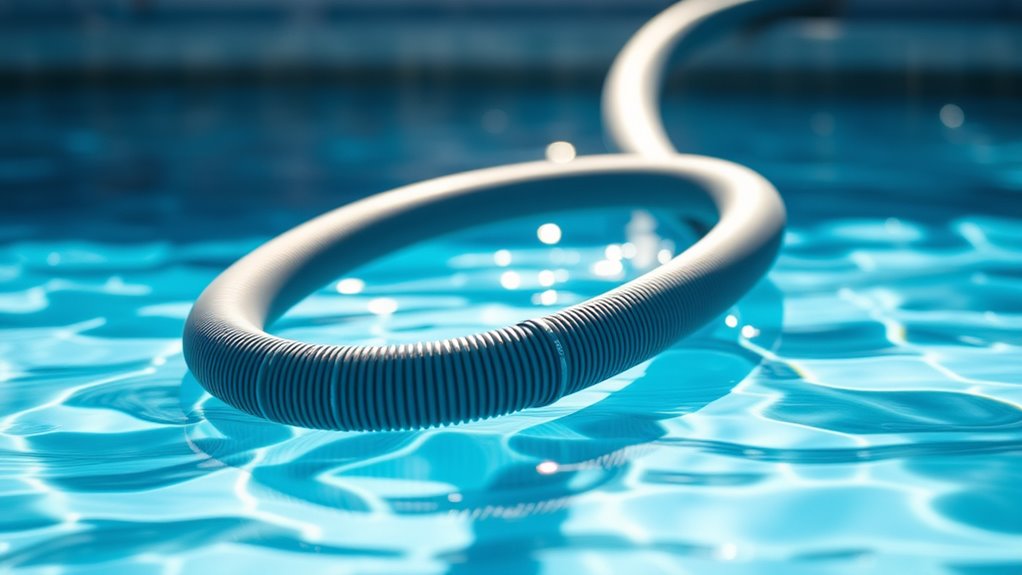
Choosing the right hose length and flexibility guarantees your pressure pool cleaner operates efficiently across your entire pool. A hose that’s too short limits movement, while one that’s too long can cause tangles. Flexibility in the hose allows smooth navigation around corners and obstacles. When selecting, consider the pool size and shape to ensure ideal coverage. Flexible hoses make maneuvering easier, reducing strain on the cleaner and preventing damage. Proper hose management can also prevent hose tangling, which is vital for maintaining consistent cleaning performance. Here’s a visual to help:
| Hose Length | Hose Flexibility | Effect on Cleaning |
|---|---|---|
| Adequate for pool size | High flexibility | Better coverage, less tangling |
| Too short | Rigid or inflexible | Limited movement |
| Too long | Flexible but cumbersome | Easier to navigate, but manage length |
Matching hose length and flexibility to your pool ensures thorough, hassle-free cleaning.
Durability and Build Quality

Since your pressure pool cleaner will be exposed to water, chemicals, and frequent use, prioritizing durability and build quality is essential for long-lasting performance. Look for a unit made from high material strength plastics or metals that can withstand wear and tear. Corrosion resistance is equally important, especially if your pool chemicals are harsh or if the cleaner is regularly submerged. Materials like corrosion-resistant plastics and stainless steel components help prevent rust and degradation over time. A well-built cleaner with sturdy joints and reinforced parts will endure repeated use without breaking down. Investing in a model with solid construction ensures your cleaner remains reliable season after season, reducing replacement costs and maintenance headaches. Incorporating AI-driven innovations in design can further enhance the durability and overall performance of your pressure pool cleaner. Additionally, selecting models with robust electrical components can prevent failures caused by water exposure or electrical faults. The use of advanced materials and quality manufacturing standards contributes significantly to a longer lifespan and consistent operation. Modern engineering techniques also play a crucial role in improving the robustness of pool cleaners. Durability and build quality are key for a long-lasting, effective pressure pool cleaner.
Energy Efficiency and Maintenance Needs

Energy efficiency is a crucial factor to contemplate because it directly impacts your pool maintenance costs and environmental footprint. Look for a pressure pool cleaner with solar compatibility, which can reduce electricity use and save you money over time. A model with low noise levels makes cleaning less disruptive and more pleasant. Regular maintenance needs should also be minimal; choose a cleaner with accessible parts and simple filter systems to make upkeep easier. An energy-efficient design not only cuts costs but also prolongs the unit’s lifespan. Additionally, selecting a model with user-friendly features can simplify routine tasks and enhance your overall experience. When evaluating different models, consider the performance ratings to ensure you’re selecting a reliable and effective cleaner. By selecting a cleaner that balances high performance with low energy consumption and easy maintenance, you’ll enjoy a cleaner pool while being environmentally conscious and saving money.
Frequently Asked Questions
How Often Should I Replace the Filter or Brushes on My Pressure Pool Cleaner?
You should check your pressure pool cleaner’s filter regularly and perform filter maintenance when it becomes clogged or dirty, typically every few weeks or as needed. For brushes, replace them when they show signs of excessive wear or damage, usually every 6 to 12 months. Proper filter maintenance and timely brush replacement guarantee your cleaner operates efficiently, extending its lifespan and keeping your pool spotless.
Can Pressure Pool Cleaners Handle Debris Like Leaves and Twigs Effectively?
Ever wonder if your pressure pool cleaner can handle leaf debris and twigs removal effectively? It definitely can, especially if it has strong suction power and an efficient debris bag. These cleaners excel at picking up larger debris like leaves and twigs, making your pool sparkle. Just make certain it’s equipped with a wide intake and durable brushes, so it can tackle that debris without missing a beat.
Are There Models Suitable for In-Ground and Above-Ground Pools?
You’ll find many pressure pool cleaners are versatile, with models suitable for both in-ground and above-ground pools. Look for in-ground compatibility if you have a larger, built-in pool, as these models often have longer hoses and better coverage. For above-ground pools, choose above-ground suitability cleaners that are lightweight and easier to maneuver. Many options are designed to work efficiently on both types, making your cleaning routine simpler and more effective.
What Safety Features Should I Look for in a Pressure Pool Cleaner?
When choosing a pressure pool cleaner, you should prioritize safety features that protect your pool and family. Look for models with reliable electrical safety, such as ground-fault circuit interrupters (GFCI), which prevent electrical shocks. Ensuring the cleaner has secure connections and a sturdy build promotes pool safety. These features minimize risks and keep your cleaning routine safe, so always check for certifications and safety mechanisms before purchasing.
How Does the Size of My Pool Influence Cleaner Selection?
When choosing a pressure pool cleaner, pool size considerations are key. For larger pools, you’ll want a cleaner with a higher cleaner capacity comparison, meaning it can cover more area efficiently without constant refilling or maintenance. Smaller pools need less powerful cleaners, so you can opt for models with lower capacity. Always match the cleaner’s capacity to your pool size to guarantee effective cleaning and avoid unnecessary wear and tear.
Conclusion
When choosing a pressure pool cleaner, focusing on suction power, maneuverability, and durability guarantees thorough cleaning and long-lasting performance. Did you know that energy-efficient models can save you up to 30% on energy costs annually? Prioritize ease of use and flexible hoses for hassle-free maintenance. By selecting a cleaner with these top features, you’ll enjoy a sparkling pool with less effort and more peace of mind.
